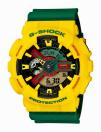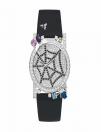-
奢侈品在中国 未来走向何方——中国本土奢侈品品牌正面临挑战
- 发布: 2011-3-19 13:02 来源:
第一消费
文字: 大 |
中 |
小
Luxury brands are losing their exclusivity As more and more young Chinese people can afford global luxury goods, today's luxury goods are becoming t omo r r o w ' s n e c e s s i t i e s . A n i n c r e a s i n g n umb e r o f Chinese people, including white-collar workers and other middle-class groups, are buying luxury goods to reward themselves. As a result, many traditional luxury brands are changing their business strategies to lure them, eschewing exclusivity and welcoming the new source of income.
奢侈品牌正慢慢失去他们的独特性 越来越多的中国年轻一代开始购买世界级奢侈品,今天的奢侈品对于明天来说只是一种必需品。伴随着白领和中产阶级的不断扩大,他们会经常买奢侈品来奖励自己。因此,许多传统奢侈 品品牌正在改变他们的经营策略,以吸引他们,避免排外和文化差异,并欢迎新的消费群体。
Everybody wants luxury, but not at any price The popular Internet shopping forum Taobao, the legitimate traders list their wares. A great number of these online stores are based in Beijing, run from residents' homes. These traders draw on contacts abroad to supply goods that substantially undercut the official outlet price. In fact, the prices are so reasonable that many of those walking down the street are likely to have purchased from these sources.
人人都爱奢侈品,但却不是接受很多合法的商家列出了他们可以供应的货源在着名的网站购物平台淘宝网上,这些大量的网上商店的总部设在北京,很多都 是在居民的家中。这些商家可以直接从海外拿到很多奢侈品,大大低于官方的出口价格。这样,更多的人愿意接受这样合理的价 格会选择从这个渠道购买商品。
Luxury goods can't buy happiness Some white-collar's desire to show off one's taste for elegance locks middle-class Chinese into a competitive struggle to sport the latest and best Italian clothes, designer handbags. But the scramble for luxury products doesn't seem to have made Chinese any happier. Indeed, in the most recent University of Michigan World Values Survey, China ranked 46th in the world with respect to the happiness of its citizens.
奢侈品会带来幸福么很多都市白领渴望通过精美的意大利衬衣、名牌手袋等来展示自己与众不同的品味。但是对这些奢侈品的争抢似乎没有使这 些人们更加快乐。事实上,密歇根大学在世界价值观调查中发 现,中国公民就其幸福感而言的在世界上排名才46位。
TAG: 爱马仕 奢侈品 奢侈品品牌 中国 本土
-
- 奢华
- 珠宝
- 美容
- 服饰
- 女人
-
- 奥迪电动自行车Worthersee:高端运动.
- 香港选购名表的全新体验——2012 D.
- 牙买加风来袭 G-SHOCK热情活力抢眼
- G-SHOCK NOISE x编号223:我的拍摄.
- “生如夏花——黄梦洁作品展”在福.
- 探密超薄机芯制表工艺的极限
- 三叉星徽耀动北京车展——梅赛德斯.
- 唯雅诺皓驰版重装上市,顶级MPV续写.
- 福建奔驰引领高端商务车进入“奔驰.
- 热波来乐 联想的娱乐营销新时代
- 岁末寻宝新去处 翡翠原石50元秒杀
- “日落之钻” 界上最大的梨形鲜彩黄钻
- 『百年好合——胡焱荣翡翠艺术展』.
- DERAIN高品级美钻 闪耀幸福人生
- 乔易•塞纳多首饰演绎女性至真.
- 瑞恩钻饰牵手百合网,让钻石的光芒.
- 佐卡伊七夕珠宝大爱中国元素新品中.
- 瑞恩钻饰会员突破两百万 重礼寻“曾.
- 量贩钻石行业打响渠道战:每克拉美.
- 玉翠山庄韵·香逸主题惊艳亮相上海.
- 静佳JPlus玫瑰花酿花瓣面膜 肌肤爱.
- 母亲节,我拿什么奉献给你——我的.
- 完美底妆三部曲
- 芸萃精油:云南献给天下女人的礼物
- 伊利己悦宣言:做自己的人间四月天
- 美容达人晒“神秘驻颜术”,瞬间年.
- 欢迎光临VINISTYLE直营旗舰店
- “大娘”变“少妇” 诺曼姿原液逆转.
- 伊利己悦“粉”时刻,让美丽此刻出发
- 源自德国的殿堂级胶原蛋白,Dlishk.
















